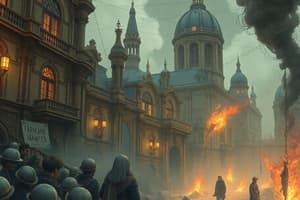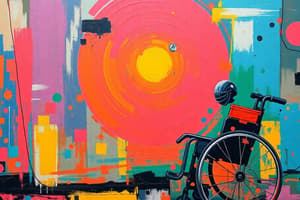Podcast
Questions and Answers
In 'The Road,' what is the most significant implication of the wife's suicide for the man's character and his journey with his son?
In 'The Road,' what is the most significant implication of the wife's suicide for the man's character and his journey with his son?
- It exemplifies a rational decision to avoid suffering, influencing the man's strategies for survival.
- It represents a profound loss that fuels his determination to protect his son from the same despair. (correct)
- It serves as a constant reminder of the futility of hope, reinforcing a pragmatic approach to survival.
- It highlights the breakdown of traditional family values, encouraging the man to create his own moral code.
How does 'The Road' use the post-apocalyptic setting to explore the theme of societal breakdown?
How does 'The Road' use the post-apocalyptic setting to explore the theme of societal breakdown?
- By demonstrating the resilience of political systems, adapting to new environmental and social conditions.
- By displaying isolated incidents of violence, unrelated to the broader societal structure.
- By illustrating a return to egalitarian communities, fostering cooperation and mutual support.
- By presenting a descent into barbarism, highlighting the consequences of widespread destruction and scarcity. (correct)
What is the significance of the old man in "The Road"?
What is the significance of the old man in "The Road"?
- He represents a character foil to the protagonist.
- He represents the dangers of trusting strangers.
- He represents a symbol of the protagonist's past.
- He serves as a brief connection and shared humanity in the desolate landscape. (correct)
Flashcards
"The Road" (Film)
"The Road" (Film)
A 2009 film about a father and son's post-apocalyptic journey.
The Cataclysm
The Cataclysm
An event that destroyed most life on Earth, leading to a struggle for survival.
Journey's Goal
Journey's Goal
Moving south to escape the cold and find potential resources.
Survival Dangers
Survival Dangers
Signup and view all the flashcards
Staying "the good guys"
Staying "the good guys"
Signup and view all the flashcards
Survival Instinct
Survival Instinct
Signup and view all the flashcards
Father-Son Bond
Father-Son Bond
Signup and view all the flashcards
Societal Collapse
Societal Collapse
Signup and view all the flashcards
The Boy (in 'The Road')
The Boy (in 'The Road')
Signup and view all the flashcards
Cinematography of 'The Road'
Cinematography of 'The Road'
Signup and view all the flashcards
Film Adaptation of 'The Road'
Film Adaptation of 'The Road'
Signup and view all the flashcards
The Fire (Symbolism)
The Fire (Symbolism)
Signup and view all the flashcards
The Road (Symbolism)
The Road (Symbolism)
Signup and view all the flashcards
"Good Guys"
"Good Guys"
Signup and view all the flashcards
The Pistol (Symbolism)
The Pistol (Symbolism)
Signup and view all the flashcards
Food (Symbolism)
Food (Symbolism)
Signup and view all the flashcards
The Boy (Symbolism)
The Boy (Symbolism)
Signup and view all the flashcards
John Hillcoat
John Hillcoat
Signup and view all the flashcards
Study Notes
- "The Road" is a 2009 American post-apocalyptic survival film directed by John Hillcoat, based on the 2006 novel of the same name by Cormac McCarthy.
- The film stars Viggo Mortensen and Kodi Smit-McPhee as a father and son making their way across a bleak, post-apocalyptic America.
Plot Summary
- The film depicts a post-apocalyptic world, years after an unnamed cataclysmic event that obliterated most of the human and animal population.
- The story follows a man and his young son as they journey through the desolate landscape, heading south in search of a warmer climate and potential survival.
- They face dangers such as starvation, exposure, and encounters with desperate and ruthless survivors, some of whom have resorted to cannibalism.
- The man, haunted by flashbacks of his wife who chose suicide rather than face the horrors of the new world, is determined to protect his son at all costs.
- The father teaches his son how to survive, hunt, and defend himself, while also instilling in him a sense of morality and the importance of remaining "the good guys."
- As they travel, they scavenge for food and supplies, encountering abandoned towns and remnants of the old world.
- Throughout their journey, the man's health deteriorates, and he becomes increasingly aware of his mortality, focusing on preparing his son for survival after his death.
- Eventually, the man dies, leaving the boy alone.
- Shortly after, the boy is found by a man, along with his wife and two children and they take him in.
Major Themes
- Survival and Perseverance: The film explores the primal instinct to survive in the face of overwhelming adversity, highlighting the resilience of the human spirit.
- Father-Son Relationship: The bond between the man and his son is central to the story, portraying the lengths a parent will go to protect and care for their child.
- Morality and Hope: Despite the bleakness of their surroundings, the man strives to maintain his and his son's humanity, clinging to hope and goodness in a world devoid of both.
- Loss and Grief: The film delves into the themes of loss, grief, and despair, as the characters grapple with the devastation of the world and the death of loved ones.
- The Breakdown of Society: "The Road" depicts the collapse of societal structures and the descent into barbarism, illustrating the consequences of widespread destruction and scarcity.
Characters
- The Man (Viggo Mortensen): A father who is fiercely protective of his son, determined to ensure his survival in the post-apocalyptic world.
- The Boy (Kodi Smit-McPhee): The man's son, who represents innocence and hope in the face of despair.
- The Wife/Mother (Charlize Theron): Appears in flashbacks as the man's wife; she eventually loses hope and chooses to end her life.
- The Old Man (Robert Duvall): An elderly traveler the man and boy encounter on the road, offering a brief moment of connection and shared humanity.
Cinematography and Setting
- The film is known for its stark and desolate visuals, capturing the bleakness of the post-apocalyptic landscape.
- The cinematography employs muted colors and a desaturated palette to enhance the sense of decay and hopelessness.
- The setting is a post-apocalyptic United States, with abandoned cities, barren landscapes, and a perpetual gray sky.
- The film was shot in various locations, including Pennsylvania, Oregon, and Washington state, to create the desolate and destroyed environment.
Adaptation from the Novel
- The film is a faithful adaptation of Cormac McCarthy's novel, preserving the story's themes, tone, and core relationship between the father and son.
- Some details and backstories were omitted or condensed in the film adaptation due to time constraints.
- The film captures the novel's sparse and poetic dialogue, as well as its emphasis on the internal thoughts and emotions of the characters.
Reception
- "The Road" received generally positive reviews from critics, who praised its performances, cinematography, and faithfulness to the source material.
- Viggo Mortensen's performance as the man was widely acclaimed, earning him numerous award nominations.
- Some critics found the film to be excessively bleak and depressing, while others appreciated its unflinching portrayal of a post-apocalyptic world.
Symbolism
- The fire: Represents hope, warmth, and civilization in a world that has lost these qualities. The man constantly tries to keep the fire burning, both literally and metaphorically, by protecting his son and maintaining their humanity.
- The road: Symbolizes the journey of life, filled with challenges and uncertainties. The man and boy's journey south represents their search for a better future, even though the road ahead is fraught with danger.
- The "good guys": The man and boy identify themselves as the "good guys," representing their commitment to morality and compassion in a world where these values are rare. This symbol reinforces the theme of maintaining humanity in the face of adversity.
- The pistol: Represents protection and the will to survive. The man uses the pistol to defend himself and his son, but also recognizes the moral implications of taking another person's life.
- Food: Symbolizes survival and the basic necessities of life. The scarcity of food highlights the desperation of the characters and the breakdown of society.
- The boy: Represents innocence, hope, and the future. The man sees his son as the embodiment of goodness and strives to protect him from the horrors of the world.
Production Notes
- The film was directed by John Hillcoat, known for his dark and gritty filmmaking style.
- The screenplay was written by Joe Penhall, who adapted Cormac McCarthy's novel for the screen.
- The film was produced by 2929 Productions, a production company founded by Mark Cuban and Todd Wagner.
- The original score was composed by Nick Cave and Warren Ellis, creating a haunting and atmospheric soundtrack.
Studying That Suits You
Use AI to generate personalized quizzes and flashcards to suit your learning preferences.




